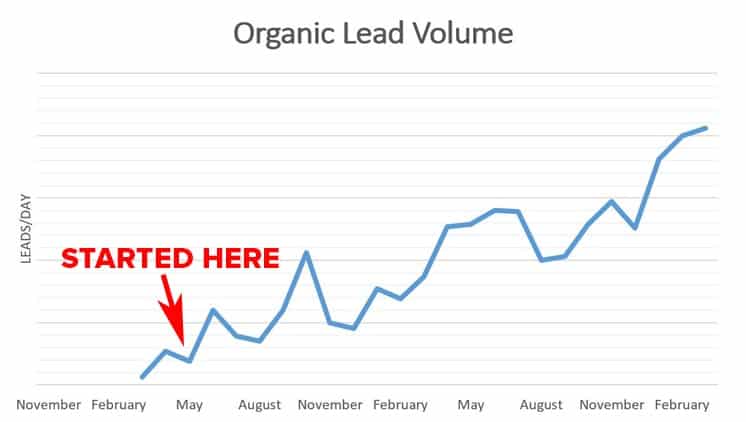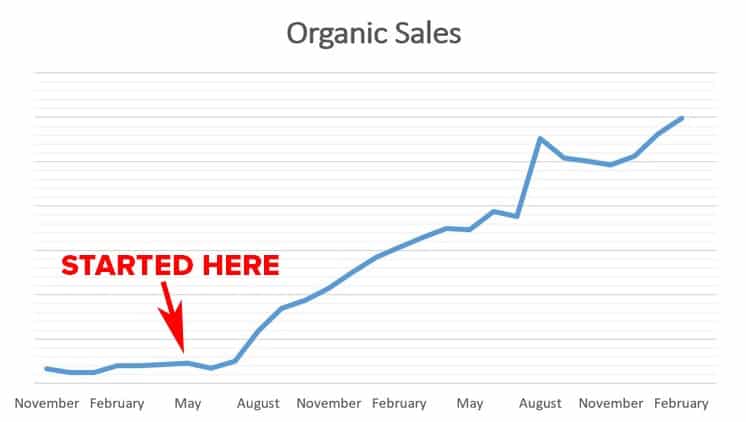Becoming a Thought Leader: Is It Worth the Effort?
by Aden Andrus • April 7, 2017
Business owners and marketers love to toss around the term “thought leader”. It’s an exciting term that evokes images of TED talks, Time Magazine photos and a never-ending supply of free business.
While the actual term “thought leader” has drawn sharp criticism in recent years, the fundamental principle behind thought leadership is fundamentally sound:
If people think you’re an expert, they’ll want to work with you.
Unfortunately, there’s a big difference between the marketing definition of “thought leader”, which usually works out to mean “someone who talks or writes about their industry” and actual “thought leadership”, which is probably best defined as “creating new value and thought in your industry.”
The former gets criticized. The latter…gets noticed.
Now, “creating new value and thought in your industry” takes a lot more time and effort than simply rehashing the content of true thought leaders. So, this begs the question, is true thought leadership worth the effort?
Does thought leadership really help your business in a measurable, financially meaningful way?
Measuring the Impact of Thought Leadership
To answer that question, we need to take a look at how thought leadership affects your bottom line.
Unfortunately, the benefits of thought leadership can be very difficult to quantify. What is the return-on-investment for an idea? Can you create an equation for reputation? How do you measure the impact of a new analysis?
Given all of these obstacles, it’s no surprise that marketers typically suggest using surrogate indicators like social shares, comments or backlinks to measure the success or failure of your thought leadership efforts. After all, that’s about as good as you can do, right?
I beg to differ.
If you are a true thought leader, your efforts deliver far more value than mere tweets or backlinks. True thought leadership makes people want to work with you and has a huge impact on your bottom line.
Blogging is Not Enough
When I first started working at Disruptive Advertising, our blog had well over 100 blog posts, but it wasn’t really producing all that much traffic—let alone leads or sales. Why? Our blog wasn’t really creating new value.
We weren’t leaders, we were followers.
Sure, from a marketer’s perspective, we were thought leaders. We were writing a lot of industry-related content. But we weren’t really leading, we were just rehashing existing ideas—and it showed in our results.
Becoming a Thought Leader
To be honest, this situation bugged me. I’ve always been a big believer in creating value—so, if we were going to write blog posts, we needed to create value.
With that in mind, I overhauled our blogging strategy. I took over all blog editing and began working with our contributors to ensure that our articles were helping to advance our industry.
I’ll admit that I was a bit nervous about trying to create thought leadership in the digital marketing world. My primary background was in biotech and product development, not marketing, but from those experiences, I knew that no matter what industry you’re in, people respond best when you create real value for them.
So, I dove in and started creating value. Almost overnight, things began to improve.

As you might imagine, our thought leadership efforts produced more than just organic results, but you “earn” organic traffic through the quality of your content, so it’s a great indicator of thought leadership.
And it wasn’t just traffic that improved. Far more importantly, our organic lead volume shot through the roof.

Today, Disruptive Advertising gets 32x more organic leads than it did 2 years ago. However, any good blog editor knows that more organic “leads” is not the same thing as more organic sales.
Here’s how that lead volume translated into sales:

See that funny little dip after August? It turns out that being a thought leader comes with a lag period. It takes a while before your best leads start to pour in.
To our surprise, about a year after we changed our approach, we began to get a ton of incredibly high-intent organic leads who were saying things like:
- “What really drew me to you guys was your content–the really valuable stuff you are always sharing…that’s how I knew you guys know your stuff.”
- “I was really impressed with your overall approach to AdWords. I’ve read a few of your articles and it seems like you guys really know what you’re doing. I was like, I have to reach out to these guys and see what they can do for me.”
By August, we were getting so many high-quality leads that we had rein things in to avoid overloading our account managers. It took a few months to gear up, but eventually we were ready to open the floodgates again.
Despite this hiccup, our content now drives 8.15x more new revenue each month than it did even one year ago…and 64x more revenue than it did two years ago.
I don’t know about you, but numbers like that get me a lot more excited than share counts.
Conclusion
So, does thought leadership generate meaningful business results? Absolutely. In fact, if you do it right, becoming a thought leader in your industry is one of the most effective ways to build your business.
The good news is, it’s possible for almost anyone to become a thought leader in almost any industry. All you have to do is learn how to create value in that industry.
After all, I didn’t spend years training to become a digital marketing thought leader. I simply looked for ways to create new, compelling content. As a result, Disruptive experienced incredible growth—and you can do the same for your business.
By the way, if you’re thinking about ways to become a thought leader in your own industry and want to bounce ideas off of someone, let me know here or in the comments! I’d love to help out.
How do you feel about thought leadership? How do you feel about Disruptive’s content? What can we do to provide more value?





